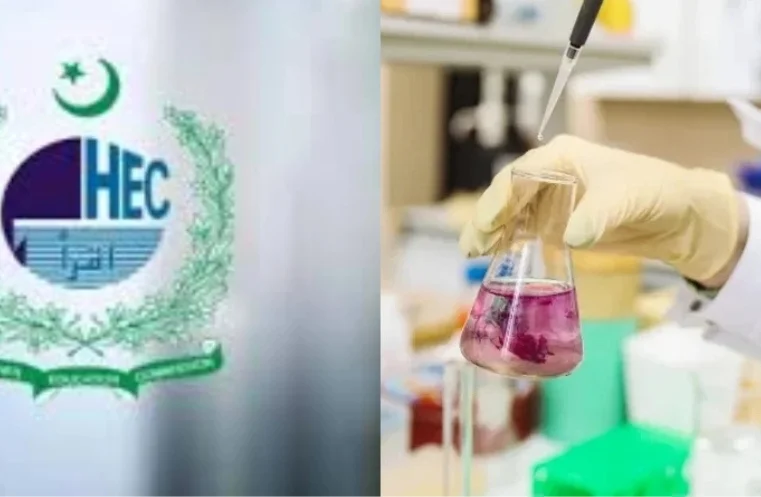Islamabad, Mar 7, 2025: The Higher Education Commission (HEC) has rolled out an upgraded curriculum for associate, bachelor’s, and master’s degree programs in chemistry.
These revisions aim to enhance academic standards, bridge gaps with industry trends, and integrate modern research advancements.
However, developed by the National Curriculum Review Committee (NCRC), comprising distinguished scholars from universities across the country, the revised curriculum was formally announced in a press statement on Thursday.
Previously, HEC had introduced updated syllabi for political science, Islamic studies, remote sensing & GIS, and architecture.
Additionally, the chemistry curriculum revision was spearheaded by Prof. Dr. Muhammad Athar Abbasi from Government College University Lahore, serving as the NCRC chairman, with HEC Deputy Director Muhammad Ali Baig fulfilling secretarial responsibilities.
Read More:
Punjab Schools Weekly Holiday Announced by Govt
Their extensive review ensures the curriculum remains relevant in a rapidly evolving academic and industrial landscape.
However, Dr. Amjad Hussain, Director General of HEC’s Academics Division, integrated emerging technologies into the curriculum, ensuring chemistry students gain knowledge aligned with the latest scientific advancements.
Under the revised structure, an associate degree in chemistry now necessitates a minimum of 71 credit hours, whereas a BS in chemistry mandates 137 credit hours.
Furthermore, A key highlight of the new BS program is the introduction of 14 specialized fields, allowing students to tailor their education according to their interests. The available specializations include:
- Agricultural Chemistry
- Analytical Chemistry
- Biochemistry
- Computational Chemistry
- Environmental Chemistry
- Forensic Chemistry
- Fuel Chemistry
- Industrial Chemistry
- Inorganic Chemistry
- Organic Chemistry
- Pharmaceutical Chemistry
- Physical Chemistry
- Polymer & Materials Chemistry
- Soil Chemistry
Each specialization comprises seven elective courses, with universities having the flexibility to introduce additional advanced courses based on faculty expertise and available resources.
To promote practical learning, the updated BS curriculum mandates a supervised internship and a capstone project, each worth three credit hours, to provide students with hands-on experience and enhance their research and problem-solving capabilities.
However, these requirements do not apply to the associate degree program.
Meanwhile, For MS chemistry, the revised framework includes two core courses, six elective subjects, and a compulsory research thesis.
Universities have the autonomy to design elective courses based on faculty strengths and institutional resources.
Although, the updated curriculum also defines key academic benchmarks such as eligibility criteria, learning objectives, model study plans, and degree completion requirements.
While the overarching framework remains standardized, universities control syllabus details, ensuring alignment with industry advancements while maintaining academic integrity.
However, HEC has urged universities to promptly implement the updated curricula to ensure uniformity and quality across institutions.
“These reforms highlight HEC’s dedication to fostering a research-driven education system that aligns with the evolving demands of industry and society,” the press release emphasized.
With these updates, chemistry education in Pakistan is poised to become more dynamic, empowering students with the expertise necessary to excel in both academia and professional fields.
Prominent institutions involved in the NCRC included:
- Abdul Wali Khan University, Mardan
- Bahauddin Zakariya University, Multan
- Balochistan University of Information Technology, Engineering & Management Sciences, Quetta
- COMSATS University Islamabad, Abbottabad Campus
- Government Ambala Muslim Graduate College, Sargodha
- Government College University, Faisalabad
- Government College University, Lahore
- International Islamic University, Islamabad
- NED University of Engineering & Technology, Karachi
- Quaid-i-Azam University, Islamabad
- The University of Azad Jammu & Kashmir, Muzaffarabad
- University of Balochistan, Quetta
- University of Central Punjab, Lahore
- University of Karachi, Karachi
- University of Management & Technology, Lahore
- University of Peshawar, Peshawar
- University of Sindh, Jamshoro
- University of the Punjab, Lahore
These curriculum advancements mark a significant step toward improving chemistry education, ensuring graduates are well-prepared for both academic pursuits and industry careers.









